 One of the key issues we encounter in our mobile practice is a simple question that continues to baffle most enterprises: How long should it take to develop a mobile app and how much money will it cost? One would expect that as business units and IT organizations become more experienced with mobile app development, they would get more precise with their estimates and establish internal benchmarks and metrics. However, in talking with various companies, we find there is a broad spectrum of time frames and budgets even for a basic single-page mobile app.
One of the key issues we encounter in our mobile practice is a simple question that continues to baffle most enterprises: How long should it take to develop a mobile app and how much money will it cost? One would expect that as business units and IT organizations become more experienced with mobile app development, they would get more precise with their estimates and establish internal benchmarks and metrics. However, in talking with various companies, we find there is a broad spectrum of time frames and budgets even for a basic single-page mobile app.
MGI Research recently conducted the State of Mobile Apps industry study focused on mobile app development, management and security. This article highlights survey data focused on time frames and budgets, and provides recommendations for users and vendors.
This latest mobile app study was aimed primarily at large and mid-sized enterprises and business units with responses both from IT organizations as well as line-of-business (LOB) management. We asked survey participants a number of key questions about their perception of success or failure with mobile apps; the time, cost and skills it takes to develop a mobile app; and where they think their companies fit vis-à-vis competition. In particular, we looked for two things:
- The degree to which enterprises feel they are making tangible progress with all aspects of mobile apps — from design and development to deployment, management, security, strategy, staffing, metrics and budgeting.
- What separates the companies producing outstanding results in mobile from the average?
Time
When it comes to time frame, mobile app projects tend to be relatively contained in terms of time to market with nearly half (48 percent) of companies taking six months or less to develop an average mobile app.
Figure 1 – Time to develop a mobile app
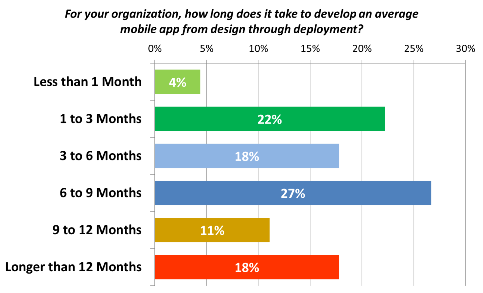
© 2014 MGI Research. All Rights Reserved
In aggregate, 75 percent of all companies reported a nine months or less development cycle for mobile apps. This is largely in line with our surveys from prior years and reflects the fast pace of change in the mobile industry as well as progress in introducing various mobile development tools.
Despite the short time frames for development that tend to compare favorably with time frames for other IT development projects, when it comes to on time delivery, mobile app projects are characterized by very poor predictability of timing.
Only 11 percent (about one in 10) organizations report a consistent on-time delivery of mobile projects.
Figure 2 – On-time delivery of mobile apps
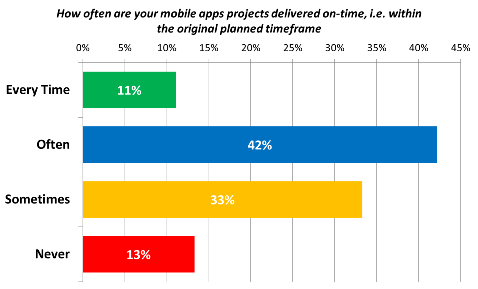
© 2014 MGI Research. All Rights Reserved
Cost
Cost and budgeting are two areas that cause significant questions for all enterprises, especially for those just getting into mobile development. Study results indicate that on average 68 percent of the companies spend $100K or less per mobile app and 48 percent (roughly half) spend less than $50K per app.
Figure 3 – Cost to develop a mobile app
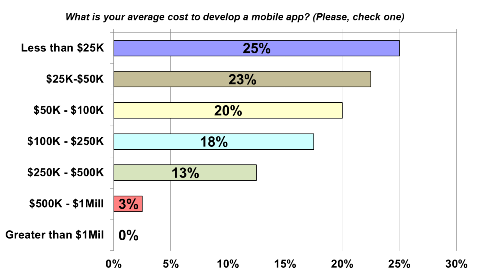
© 2014 MGI Research. All Rights Reserved
When it relates to budget, only one in seven mobile app projects (about 16 percent) consistently deliver results within the original budget.
Figure 4 – Within budget performance of mobile app development
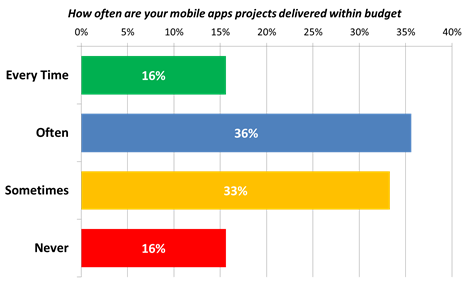
© 2014 MGI Research. All Rights Reserved
This lack of budgetary precision is a lingering problem that should get better as companies gain experience with mobile development and tools mature in their sophistication.
There is a marked difference between those who reported a “huge success” with mobile versus the average in terms of within-budget delivery. Within the leadership group (those that have had a “huge success” with mobile), 20 percent of mobile app projects are consistently delivered within the original budget while those that have not had a “huge success” with mobile apps report that only eight percent of mobile app projects are consistently delivered within the original budget.
Perhaps not so coincidentally, experience with mobile apps is also a large factor. Among those that see themselves as successful in mobile, over 30 percent have a track record of five years or more with developing mobile apps.
Taken together with the lack of on-time mobile app delivery, this paints a rather humbling picture of mobile development efficiency and agility. There seems to be a wide gap between what the business sponsors see as fast enough and cheap enough for mobile app development and the current delivery capability by internal and external resources. Level of expertise with mobile apps may offer a partial explanation for this gap. In our view, the maturity or immaturity of tools and processes hold an equal share of blame.
Key recommendations for users
Establishing clear expectations for delivery time and cost is critical before embarking on a mobile project. Gaps between user expectations and the reality of what it takes to deliver different types of mobile applications need to be addressed to ensure adequate funding and long-term success.
While B2E apps may be quick and relatively inexpensive, most B2B and B2C apps require more funding and development time than is commonly believed by the average business executive. Further, organizations that struggle to deliver non-mobile software projects on time and on budget will be equally challenged when it comes to meeting mobile app development project goals.
Key recommendations for vendors
As users gain more experience and credible survey data emerges, more refinement will be necessary around the marketing of mobile app development tools (Mobile Application Development Platforms – MADPs). We expect a range of different MADPs to proliferate. Some will be quick and cheap to develop apps, and others will deliver great apps but at a higher level of investment.
Vendors that help prospects correctly budget and establish credible project plans will ultimately win out, as their customers will achieve higher levels of success, regardless of the cost and time associated with their projects.
Bottom line
We see many best-in-class organizations constantly measuring their on-time and on-budget performance as well as searching for new creative performance metrics. Not all apps are created equal, but the results of the study show a meaningful density of results across a wide range and number of companies that operate within a variety of regulatory contexts and geographies.
Nearly half the companies in the study reported that a typical mobile app takes less than six months to develop and costs less than $100K.
Key questions for your company to consider
- Mobile strategies. Is your company in line, ahead of or behind competition in mobile?
- Mobile app priorities for the next 12 months. How is your organization prioritizing its mobile efforts for the next 12 months?
- Mobile budgets. How can you properly plan for and optimize a budget for a successful mobile effort?
- Tools. Are you falling behind in adoption of standards and technology tools? Platform vs. toolkit vs. outsource vs. package?
- Mobile skills and organizational best practices. How are best-in-class companies organized to meet the mobile time-to-market requirements? What separates the leading mobile app adopters from the average?
- Application Portfolio Metrics – How do different companies measure their mobile efforts?
The answers to these questions are provided in the full results of the mobile app study, which is available to MGI Research clients.
The study was conducted mostly online and included opinions from key corporate decision makers across industries and company sizes:
- Senior management (24%)
- Information Technology (49%)
- Decision Makers (43%)
- Recommenders (63%)
- Over 40% of responses were from companies with more than 5,000 employees.
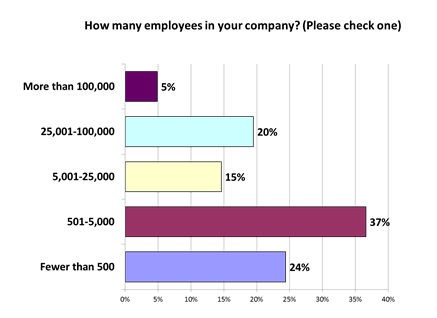
Sandhill is proud to be a sponsor of the Billing Innovators Summit East, Oct. 23, 2014 at the New York Academy of Sciences, New York, NY. This MGI Research Case Study conference features interactive conversations with executives charged with delivering new products, services and pricing/monetization models.
Andrew Dailey is a managing director of MGI Research. He leads the enterprise applications and billing solutions coverage for MGI. He has over 20 years of diversified technology and financial services experience as a software executive, industry analyst (Gartner) and advisor to Fortune 500 companies. Follow him on Twitter.
